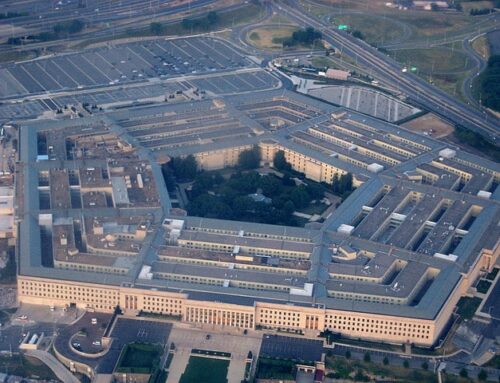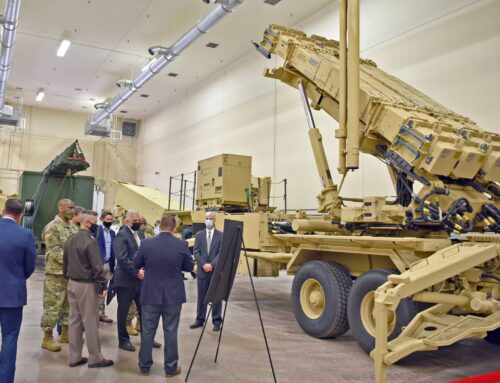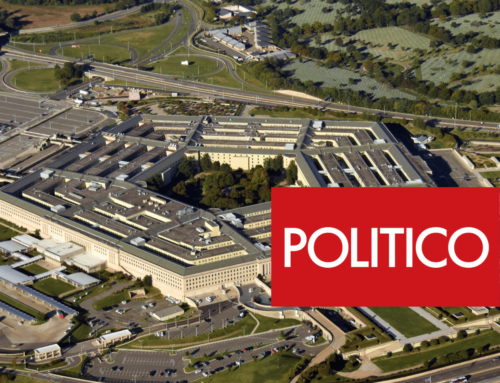If you’ve been reading much news on the military industry lately, you could be forgiven for thinking that military contractors are being crushed under the weight of inflation, industrial base woes, and budget caps.
They aren’t.
Last week, five of the largest military contractors in the nation, General Dynamics, L3Harris, Lockheed Martin, Northrop Grumman, and RTX (formerly known as Raytheon), reported Q1 earnings showing $4.1 billion in share buybacks in the first quarter of 2024.
For the uninitiated, companies that are doing well often spend a portion of their profits to buy back shares in their stock in order to drive up the share price. It’s a common practice and there’s nothing inherently wrong with it—unless those companies are heavily subsidized and seeking taxpayer-funded bailouts.
Last year, Northrop Grumman lobbied Congress to authorize price increases for firm fixed-price contracts—contracts where the Pentagon theoretically pays a company a guaranteed price for a product or service regardless of whether the end price is higher or lower than anticipated. This type of contract is meant to ensure that the contractor will reap the reward if they can keep the price down, and that the Pentagon (i.e. taxpayers) won’t be on the hook if the price goes up. But the industry wants to have its cake and eat it too. Pushing for price adjustments to firm fixed-price contracts when the cost of a program rises allows them to do just that.
To justify this push for an industry-wide authorization for price adjustments, Northrop claimed the B-21 program, a nuclear bomber that will replace the B-2 Spirit bomber, was facing inflation-related cost increases, a claim it has not substantiated.
Even if Northrop had shared data indicating inflation-driven cost growth, as the Pentagon’s Principal Director of Defense Pricing and Contracting pointed out in guidance on price adjustments, “Contractors performing under firm-fixed-price contracts that were priced and negotiated before the onset of the current economic conditions generally bear the risk of cost increases.” Congress, in its infinite wisdom, ignored this guidance and authorized inflation bailouts in the Fiscal Year (FY) 2024 National Defense Authorization Act (NDAA).
In an April 24 earnings call, Northrop Grumman bragged to investors it had spent $1.2 billion on share buybacks in Q1, and that it plans to spend over $2 billion on buybacks over the course of the year.
In February, Navy Secretary Carlos del Toro lambasted the industry for stock buybacks. “Overall, many of you are making record profits,” he told industry leaders at an annual sea services conference. “You can’t be asking for the American taxpayer to make greater public investments while you continue to goose your stock prices through stock buybacks, deferring promised capital investments, and other accounting maneuvers.”
As Congress prepares to mark up the FY25 NDAA, some lawmakers are actively flirting with the idea of ignoring budget caps agreed to last year in order to boost Pentagon spending above the $850 billion base budget request, citing inflation and the need for more industrial base funding.
These arguments misdiagnose the problem as inadequate spending. While inflation exists and the industrial base needs some attention, Congress shouldn’t ask taxpayers to foot the bill while Pentagon contractors and their shareholders rake in record profits. Virtually every other industry in the nation has to deal with inflation and industrial capacity challenges as standard costs of doing business. Pentagon contractors should too—and as these buybacks demonstrate, they can afford to.
If the military industry weren’t able to make the necessary investments to address industrial base challenges, Congress would be right to step in. But if, as these buybacks indicate, the industry just isn’t willing to, Congress should weigh its options for incentivizing a change in behavior rather than throwing more taxpayer dollars at the problem.
- Image by Michael Kin from Pixabay











Get Social